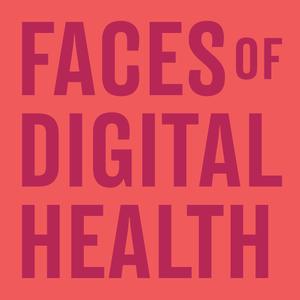
Faces of Digital Health
Tjasa Zajc
A podcast about digital health and how healthcare systems adopt technology.
- 10 minutes 4 secondsThe future of data in in collaboration among standards bodies (Rachel Dunscombe)
This short discussion with Rachel Dunscombe, CEO of openEHR International Foundation, was recorded in Reading at the first openEHR Annual conference. Rachel Dunscombe discussed trends in data standards and the importance of structured data for the future development of AI.
Recap of the discussion:
- Historical Context and Progress in Data Standards:
- Thirty years ago, the "Good European Healthcare Record" initiative aimed to create a standardized European healthcare record. How does it relate to EHDS and efforts for single patient records on European level.
- Unlike the past, today's digital landscape and AI advancements underscore the importance of standardized, actionable data for remote care and patient self-management.
- Collaboration Among Standards Bodies:
- Recent years have seen increased cooperation among standards organizations like FHIR, OpenEHR, and SNOMED, with a focus on complementing rather than duplicating efforts.
- Standards bodies are now defining clearer roles and working together toward a unified goal of improving healthcare outcomes.
- Need for Practical Implementation and Governance:
- Effective implementation of standards requires practical guides for healthcare systems, developed collaboratively by standards bodies.
- Open, democratic communities with strong governance are essential to ensure diverse input and practical guidance for using standards effectively.
- AI and Data Quality:
- Good data quality is foundational for effective AI in healthcare; without it, AI solutions cannot achieve optimal results.
- Standards are crucial for creating "trustworthy" AI and have been discussed at forums like the United Nations, emphasizing the need for global alignment on data standards.
- Future Goals and Global Standards:
- Continued development of clear, internationally recognized standards will support interoperability and innovation in healthcare, including AI-driven solutions.
- Guidelines from standards bodies are anticipated to help healthcare systems apply data standards cohesively for population health benefits.
- Resources and Engagement:
- The podcast "Faces of Digital Health" and its associated newsletter discuss these topics, offering updates on trends and insights in healthcare digitalization and standards.
www.facesofdigitalhealth.com
Newsletter: https://fodh.substack.com/
14 November 2024, 8:57 am - 30 minutes 7 secondsZayna Khayat: Language, Mindset and the Future of Care
In this discussion, strategist, and applied health futurist Zayna Khayat explores the evolution of healthcare, particularly the shift towards home-based care and patient empowerment. Key themes include:
Language in Healthcare: Khayat stresses the need for a language shift to change mindsets in healthcare, highlighting that words shape reality. She proposes retiring overused terms like “innovation,” “patient-centered,” and “telemedicine,” advocating instead for more precise language that reflects modern, patient-empowering approaches.
Technology in Care Delivery: Khayat is excited about how AI and virtual reality (VR) are transforming healthcare. She sees AI as instrumental in reducing clinician workload by handling repetitive cognitive tasks, while VR is proving beneficial in medical training and therapies like pain and anxiety management.
Shift to Home and Virtual Care: Drawing on her experience in home-based chemotherapy, Khayat discusses the challenges of moving healthcare out of hospitals, from reimbursement to infrastructure limitations. She emphasizes that many patients would prefer home care if given the choice, but practical barriers like resource availability and payment models persist.
Diverse Aging Models: Khayat challenges the idea of care homes as a one-size-fits-all solution, advocating for diverse models tailored to individual preferences and cultural values. She highlights that community-based models, like those in Denmark and Japan, provide alternatives to institutional care, supporting aging in place.
Value-Based Care and Accountability: Khayat encourages healthcare organizations to focus on results rather than processes. She advocates for outcome-based payment models, where organizations are compensated for results, pushing them to prioritize patient outcomes. This approach, she argues, would foster a value-driven healthcare system.
www.facesofdigitalhealth.com
Newsletter: https://fodh.substack.com/
11 November 2024, 11:00 pm - 19 minutes 8 secondsHow Patients Use AI (Grace Vinton, Grace Cordovano)
Grace Cordovano is an expert healthcare navigating solutionist and award winning, board-certified patient advocate, and Grace Vinton is an account director at Amendola, Patient Advocate, and the host of Like a Girl Media's Podcast "HITea With Grace”.
In this discussion, recorded at Digital Health and AI Summit in Boston, they discussed AI use cases for improved patient experience in healthcare, how patients already use AI, and more.
Read the summary of the event in our newsletter: https://fodh.substack.com/p/ai-digital-health-pharma
Key points:
- AI can significantly reduce the administrative burden on patients, especially those managing chronic conditions, caregiving responsibilities, or complex medical records.
- Patients are using tools like ChatGPT to prepare for medical appointments by generating lists of questions and organizing medical records.
- AI can assist with translating complex medical information into more understandable language.
- Patient advocates emphasized the importance of involving patients in the design and implementation of AI in healthcare, ensuring tools cater to different types of patients (e.g., those with terminal illnesses, multiple comorbidities, etc.).
- It is critical for healthcare companies to involve diverse patient voices throughout the development of AI tools and offer fair compensation to prevent bias.
- The healthcare industry needs to improve digital literacy among patients, ensuring they understand how to use AI tools effectively and responsibly.
- Resources like the Patients Included Charter and organizations like the Light Collective and Savvy Coop were highlighted as valuable for patient education and advocacy.
Advice for Patients on Using AI:
1. Start with Questions
2. Refine Prompts
3. Check for Errors
4. Be mindful of security and data privacy
https://www.facesofdigitalhealth.com/
3 November 2024, 9:50 pm - 17 minutes 16 secondsGary Monk on DTx and Common Sense in Analysing Wellness Data From Apps and Wearables
In this episode Gary Monk, independent consultant with over 25 years in the pharma and healthcare sectors where he worked in roles from R&D to business IT and strategic marketing, talks about the current state of digital therapeutics, remote patient monitoring, the potential of AI in healthcare, and the challenges with data integration. He also shares his personal insights on the use of wearables and their impact on health anxiety.
Key Discussion Points:
Digital Therapeutics and Integration Challenges
Fragmentation in the Space: Many digital therapeutics are siloed, with individual apps that do not integrate well with each other or broader healthcare systems.
Potential for Holistic Solutions: apps and digital therapeutics need to be more connected, for example, integrating with wearables or offering treatments.
Uncertain Future: While optimistic in the long term, Gary is cautious about short-term setbacks, noting that companies in this space may struggle without proper evidence and reimbursement models in place.
Remote Patient Monitoring and Virtual Care
Excitement Around Remote Monitoring: there are benefits of remote monitoring, especially for elderly and chronically ill patients, allowing them to stay home longer and safer.
Expanding Beyond Monitoring: Discussion expands on using technology not just for monitoring but also for providing interventions, such as reminders, voice support, and even predictive capabilities like fall prevention.
Wearables and Real-World Data
The Importance of Continuous Data: long-term, imperfect data may be more valuable than short-term, highly accurate clinical data in certain cases, such as tracking motor function.
Personal Experience with Wearables: Despite his enthusiasm for digital health, Gary admits he no longer uses wearables due to anxiety caused by over-monitoring and lack of actionable insights.
AI in Healthcare
Cautious Optimism: While excited about AI’s potential, AI needs to be integrated thoughtfully into healthcare workflows. He points out that many current AI solutions are useful but not yet integrated into clinical practice.
Ethical Questions Around AI: The conversation touches on whether AI should be used to predict diseases, especially if no treatment is available. This is particularly relevant in areas like Alzheimer’s research.
Integration as a Key Barrier
The Real Challenge: Both speakers agree that integration is one of the biggest hurdles in digital health today. As various apps and AI tools proliferate, getting them to work within existing systems, like clinical workflows, remains difficult.
Example from Clinical Trials
Even in areas like remote clinical trials, which are technically feasible, organizations are struggling to keep up due to complex internal processes and outdated systems.
www.facesofdigitalhealth.com
https://fodh.substack.com/p/ai-digital-health-pharma
23 October 2024, 10:00 pm - 20 minutes 35 secondsHow Successful Digital Intervention Can Be in Mental Health?
If social media and smartphones are the root cause of the new mental health epidemic in younger generations, how successful can digital interventions be in addressing mental health issues?
In this discussion, recorded at Digital Health and AI Innovation Summit in Boston in October, Katherine Wolfe-Lyga, Mental health professional and former college administrator, Vice President at BetterMynd, discussed:
Digital Mental Health Interventions: Digital health solutions, especially telehealth, have improved access to mental health care, particularly for students in rural areas and those reluctant to seek help in person. The stigma around seeking mental health care is still significant but decreasing.
Equity and Access: Colleges have become more inclusive, admitting students from underprivileged backgrounds who often face challenges that current campus support systems are not fully equipped to address. Digital interventions are helping bridge these gaps.
Impact of Smartphones and Social Media: The pervasive use of smartphones and social media contributes to social isolation and mental health challenges, with many students relying on these platforms for comfort rather than fostering real interpersonal connections. Schools banning or limiting phone use have seen positive effects on student engagement and communication.
Digital Interventions as Both Cause and Cure: While smartphones and social media contribute to mental health issues, digital interventions like teletherapy can offer solutions. The challenge is ensuring that digital tools are used minimally and efficiently to support mental health, without exacerbating the problems of overuse.
Brain Development: There is evidence suggesting that the development of the prefrontal cortex in young people is delayed, potentially due to changes in societal behavior and technology use, affecting their decision-making abilities and impulse control.
Mental Health Interventions and Technology: Technology can help alleviate loneliness and improve community connections, but it must be used responsibly. Ethical concerns exist around the efficacy of some digital mental health tools, as not all apps claiming to support well-being are truly effective.
Positive Trends: Successful interventions include digital platforms that provide access to diverse therapists, helping students connect with professionals who share similar identities or expertise. This encourages more students to seek help and supports the reduction of mental health issues like loneliness.
www.facesofdigitalhealth.com
Newsletter: https://fodh.substack.com/
21 October 2024, 2:10 pm - 40 minutes 12 secondsWhat is Impact Investing and Why You Should Consider Patenting Your Ideas (Michael Friebe)
In this episode of Faces of Digital Health, Michael, an experienced innovator with over 80 patents and a professor in multiple countries, joins to discuss the future of digital health. The conversation dives deep into the concepts of innovation, patent strategies, and the challenges in digital health funding. Michael shares his insights on current investment trends, the future of healthcare, and the potential of technologies like AI and digital tools to redefine medicine.
Website: https://www.facesofdigitalhealth.com/
Newsletter: https://fodh.substack.com/
Key Points:
The Role of Patents in Innovation:
Michael holds 80 patents, but only a few have translated into successful innovations. Patents serve as a starting point for innovation, not necessarily as a direct path to commercialization.
Challenges in Patent Development:
The difficulty in checking if something has already been patented due to the 18-month confidentiality period. Patenting as a strategy to establish a foundation for future projects and startups.
Current State of Digital Health Funding:
2024 has seen significant investment, especially in the U.S. market, but COVID-19 still skews comparisons.
Michael believes digital health should go beyond improving administrative workflows and focus on new forms of medicine, such as combining AI, sensors, and IoT.
Investment Challenges and New Approaches:
There is no current business model for preventive healthcare, but it’s essential for long-term health impact. Michael advocates for shifting from analog to digital processes and creating personalized, predictive healthcare.
5P Future of Health Investment Fund:
Michael has started an investment fund called "5P Future of Health," focusing on long-term impact rather than immediate profits.
Emphasis on personalized, participative healthcare, and developing tools that address health issues before they become critical.
Vision for the Future of Healthcare:
Transition healthcare from hospitals to home-based systems, using affordable and accessible diagnostic tools. The need for democratizing healthcare and creating business models that are inclusive, not just profit-driven.
7 October 2024, 10:24 am - 49 minutes 9 secondsWhere is Healthcare IT in Europe in 2024? (Tomaz Gornik)
Better is a healthcare IT provider of a healthcare data platform, low-code tools that help healthcare organisations to rapidly build applications that suit their specific need and hospital medication management software, working across 20 markets.
In this episode, based on 30+ years of experience, Tomaz Gornik, CEO of Better explained:
- what is a data platform in healthcare,
- what motivates vendors to NOT lock customers in their systems
- EHDS implementation from the healthcare IT perspective,
- the power of legislation and tender processes in shaping the future of digital health,
- how do digital health vendors get the first customer in healthcare,
- How do companies survive the long sales cycles - 3 or more years in public systems, and how is this impacting their business models,
- the role of design in health,
- and more.
Newsletter: https://fodh.substack.com/
3 October 2024, 6:08 am - 25 minutes 10 secondsHow Is NHS Working With Innovation and Startups? (Mindy Simon)
There are over 200 hospital trusts in the UK, encompassing more than 1,200 hospitals. With those numbers and a population of 67 million, the United Kingdom represents quite a large market. However, selling to the NHS is anything but easy.
Mindy Simon is Co-Director at the NHS Innovation Accelerator. She is responsible for the program's execution and provides guidance to innovators and startups that already have customers. In this episode, Mindy talked about the importance of gaining visibility within the NHS, which she says is the biggest struggle for startups. We also discussed tender processes that contribute to innovation procurement and the challenges related to the requirements in tenders. For example, startups need to be mindful of their carbon emissions—how much space software uses in the cloud or how equipment is disposed of, if you're a provider of hardware.
Apply for the accelerator by 14 October 2024: https://nhsaccelerator.com/apply/apply-nia-2025-intake/
Newsletter: https://fodh.substack.com/
Website: https://www.facesofdigitalhealth.com/
26 September 2024, 6:24 am - 33 minutes 18 seconds"The hardest technology is behaviour change" - Daniel Kraft
Daniel Kraft is a Stanford and Harvard trained physician-scientist, inventor and entrepreneur focused on accelerating much improved future of health and biomedicine at the convergence of accelerating technologies and human innovation. He is the founder of NextMed Health & Digital.Health, Chairs the XPRIZE Health Alliance, and is a sought after speaker on the future of medicine, with 6 TED & TEDMED Talks.
Join NextMed Health in December 2024 in San Diego: https://www.nextmed.health/
In this discussion, Daniel talks about:
- Basic Health Practices: The importance of sleep, diverse food, exercise, and social connections as foundational health practices, alongside high-tech tools.
- Longevity vs. Healthspan: The discussion shifts from living longer (longevity) to improving the quality of life in later years (healthspan), through proactive health measures.
- Behavior Change is Key: Digital health innovations, while advanced, still face challenges in encouraging sustained behavior change, which is crucial for better health outcomes.
- Generative Health and Personalization: The concept of "Generative Health" is introduced, where AI-based health coaches personalize advice based on individual preferences, genetics, and lifestyle.
- AI in Healthcare: AI's most immediate impact will likely be in administrative areas, reducing burnout by automating tasks and helping clinicians focus on more critical decisions.
- Hospital-to-Home Care: The shift from hospital care to home care (or "homespital") is a major trend, driven by advances in remote monitoring, telehealth, and AI-based triage systems.
- Barriers to Digital Health: Regulatory, cultural, and business model barriers continue to impede the full integration of digital health solutions, despite technological advancements.
- Future of Healthcare Delivery: As healthcare moves towards more home-based care, the infrastructure and training for clinicians must evolve to support this shift effectively.
- AI and Ethical Considerations: There is a need to balance the use of AI in healthcare with maintaining human cognitive abilities, ensuring clinicians remain skilled in diagnosis without over-reliance on technology
facesofdigitalhealth.com
Newsletter: https://fodh.substack.com/
13 September 2024, 2:25 pm - 39 minutes 36 secondsWhat does NVIDIA do in healthcare?
This episode features Dr. Chelsea Sumner discussing NVIDIA's significant role in healthcare, particularly in its work with AI startups. Key areas of focus include NVIDIA’s contributions to medical imaging, genomics, and drug discovery, and its innovative tools like Clara and NIMs. The conversation highlights how NVIDIA collaborates with startups, its global footprint, and insights into AI’s transformative potential in healthcare.
Key Points:
- NVIDIA’s Role in Healthcare:
- GPUs in Healthcare: NVIDIA's graphics processing units (GPUs) power AI and are pivotal in medical imaging, genomics, and drug discovery.
- Clara Platform: A suite of healthcare-focused AI tools supporting genomics (Parabricks), medical imaging (Moni), robotics (Isaac), and drug discovery (BioNemo).
- Collaboration with Startups:
- Inception Program: NVIDIA supports over 3,000 healthcare startups globally, offering them tools, resources, and access to venture capital (VCA).
- Diverse Startup Sizes: Startups range from small two-person teams to large-scale companies with 800+ employees.
- Examples of Partnerships:
- Mendel AI: Improved deployment efficiency by 75% using NVIDIA’s Inference Microservices (NIMs).
- Hippocratic AI: Developing empathetic AI avatars for patient interactions.
- Abridge: AI-powered clinical conversations that can generate clinical notes, saving clinicians time.
- What Are NIMs?
- NIMs (NVIDIA Inference Microservices): These microservices streamline AI model deployment, enabling faster and easier integration of AI models into applications.
- Key Healthcare Innovations:
- Genome Sequencing: NVIDIA set a world record for genome sequencing in under 6 hours, highlighting advancements in personalized medicine.
- GI Genius with Medtronic: AI-assisted colonoscopy tool leveraging NVIDIA’s technology to detect polyps, aiding in colorectal cancer prevention.
- J&J MedTech Collaboration: Connecting digital ecosystems for surgery to provide real-time insights to medical professionals.
- Global Healthcare Impact:
- NVIDIA operates in healthcare ecosystems worldwide, collaborating with startups and partners in North and Latin America, Europe, China, and APAC regions.
- Their technologies are integrated with global academic medical centers, research institutions, and conferences like RSNA and Health U.S.
- Future of AI in Healthcare:
- Digital Biology, Surgery, and Health: Key areas where generative AI will impact healthcare, from diagnostics to personalized treatment.
- Model Transparency (Model Cards): NVIDIA’s trustworthy AI initiatives include model cards, which offer transparency into AI models' development and data, aiding in mitigating bias.
www.facesofdigitalhealth.com
Newsletter: https://fodh.substack.com/
10 September 2024, 2:57 am - 53 minutes 17 secondsPortugal: Centralizing Digital Health Decision Making and Solution Design
This episode gives an in-depth insight into healthcare digitalization in Portugal. Cátia Sousa Pinto, Head of Global Digital Health and International Affairs at SPMS - shared services of ministry of health of Portugal talked about healthcare digitalization in Portugal, European Health Data Space (EHDS), patient data and more.
Key Points Summary
- Portugal's Digital Health System Design: To accelerate digital health development, Portugal created a national eHealth agency (SPMS) over a decade ago.
- SPMS Role: SPMS plays a dual role, not only regulating but also developing and maintaining ICT solutions for Portugal's healthcare system. This centralization helps prevent fragmentation and ensures interoperability.
- European Health Data Space (EHDS): EHDS is the EU's regulatory framework for cross-border health data sharing, building on initiatives like MyHealth@EU. The goal is to allow seamless healthcare across Europe, where any EU citizen can access healthcare in other countries as if they were at home.
- My Health at EU: A foundational initiative that enables cross-border exchange of health data like patient summaries and e-prescriptions between EU countries.
- Patient Data: Catia emphasized the importance of patients controlling their health data and being able to share it across healthcare providers. This includes e-prescriptions, laboratory results, and, eventually, medical images.
- Portugal's National Electronic Health Record: A key project for the country is the creation of a unified electronic health record system, allowing citizens to access all of their health data, both public and private, from a single source.
- Use of EU Funding: Portugal has allocated €300 million from the EU's recovery funds for digital health transformation, focusing on infrastructure, citizen-centric services, and reducing the burden on healthcare professionals.
- Challenges and Future Outlook: The integration of digital health into national governance and improving interoperability between systems remain ongoing challenges. Katia stressed the importance of moving towards real-time, structured health data to improve future healthcare outcomes.
www.facesofdigitalhealth.com
Newsletter: https://fodh.substack.com/
Show notes:
[00:02:00] - Overview of Digital Health in Portugal
[00:06:00] - National-Level Initiatives and Successes
[00:10:00] - European Health Data Space (EHDS) and My Health at EU
[00:16:00] - Cross-Border Care and Digital Infrastructure
[00:20:00] - The Role of SPMS in Portugal’s Digital Health Journey
[00:30:00] - Challenges and Workforce Management in Digital Health
[00:34:00] - Benefits of Centralization in Small Countries
[00:38:00] - Electronic Health Records and Expanding Digital Services, Secondary use of data [00:42:00] - Portugal’s National Electronic Health Record
[00:46:00] - Future Vision for Health Data Integration
5 September 2024, 8:00 pm - More Episodes? Get the App
Your feedback is valuable to us. Should you encounter any bugs, glitches, lack of functionality or other problems, please email us on [email protected] or join Moon.FM Telegram Group where you can talk directly to the dev team who are happy to answer any queries.
 The Diary Of A CEO with Steven Bartlett
The Diary Of A CEO with Steven Bartlett
 The Readout Loud
The Readout Loud
 FT News Briefing
FT News Briefing
 HBR IdeaCast
HBR IdeaCast
 Raising Health
Raising Health
 TED Health
TED Health